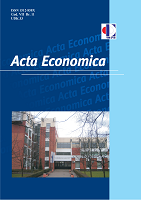УТИЦАЈ НАЦИОНАЛНЕ НА КОРПОРАТИВНУ КУЛТУРУ, ПРИМЕР ЈУЖНЕ КОРЕЈЕ
THE INFLUENCE OF NATIONAL ON THE CORPORATIVE CULTURE, USING THE CASE STUDY OF SOUTH KOREA
Author(s): Radmila MicićSubject(s): National Economy, Business Economy / Management, Micro-Economics, Economic development, Financial Markets, Socio-Economic Research
Published by: Економски факултет Универзитета у Бањој Луци
Keywords: Organization; organizational culture; national culture; South Korea;
Summary/Abstract: The influence of national on the corporative culture has been presented in this paper. First of all organizational culture is defined, and then dimensions of national cultures are stated. Special attention in this paper is paid to impact of national on the organizational culture, using the case study of South Korea. In only three decades, Korea has grown from agrarian society into a serious modern industrial power. Its rise today is considered no less than an economic miracle and an inspiration for many managers who facing with new sources of competitions. Korean corporate culture is the central building block for longterm corporate success and principal instrument of competition and vitality. A great number of characteristics distinguish the Korean firm in comparison to Japanese or American firm. These can be boiled to seven essential categories, which express the value Korean corporate culture: the centrality of work, group harmony and social contract, personal relationships, paternalism in superior/subordinate relationships, general job descriptions, nonverbal cues, the decision-making process and personal accountability. Managers of the internationally oriented companies need to continuously explore and respect the characteristics of the culture in an international environment. The world market process of globalization and business needs reorientation of enterprise business philosophy and successful turn to business surroundings.
Journal: Acta Economica
- Issue Year: 7/2009
- Issue No: 11
- Page Range: 65-85
- Page Count: 21
- Language: Serbian

